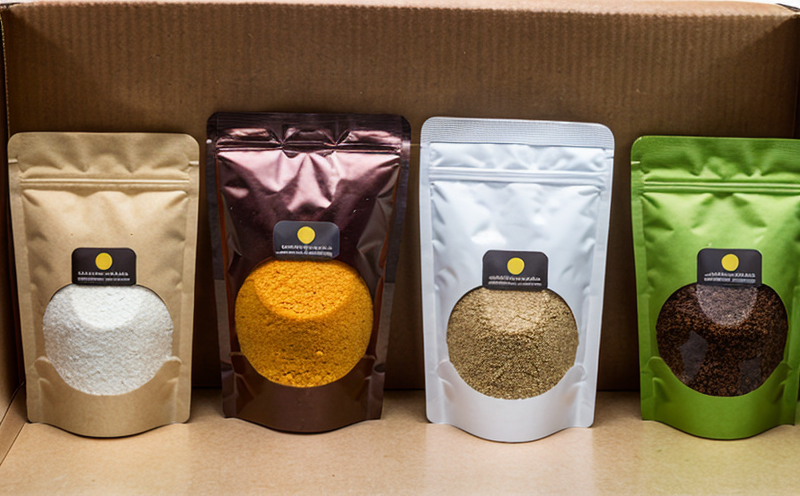Migration Testing under Long-Term Storage Conditions
Migration testing under long-term storage conditions is a critical component of ensuring the safety and quality of food contact materials (FCMs) and packaging used in consumer products. This test evaluates whether potentially harmful substances migrate from FCMs into food products over extended periods, thereby posing health risks to consumers.
The primary goal of this testing method is to simulate real-world storage conditions that FCMs might experience during their lifecycle. These conditions include temperature variations, humidity, and exposure to light, all of which can influence the migration rates of chemicals such as plasticizers, antioxidants, or other additives used in packaging materials.
Testing under long-term storage conditions is particularly important for FCMs that are exposed to prolonged contact with food products. The test parameters include temperature (e.g., 60°C), duration (up to 90 days), and the type of food simulants used, which mimic actual food products in terms of pH levels, water content, and other chemical properties.
Specimen preparation for migration testing involves selecting a representative sample size that accurately reflects the production batch. The samples are then subjected to controlled storage conditions, allowing the migration process to occur naturally over time. After the specified duration, the FCMs are analyzed using various analytical techniques such as gas chromatography-mass spectrometry (GC-MS), liquid chromatography-tandem mass spectrometry (LC-MS/MS), or Fourier transform infrared spectroscopy (FTIR).
The acceptance criteria for migration testing under long-term storage conditions vary depending on the specific FCM and regulatory requirements. Typically, the limits are set by international standards such as ISO 10397:2014 or ASTM D886-15, which define acceptable levels of migrating substances based on their toxicity and potential health risks.
Understanding the importance of this testing method is crucial for quality managers, compliance officers, R&D engineers, and procurement teams who are responsible for ensuring that FCMs meet safety standards. By conducting rigorous long-term migration tests, manufacturers can prevent contamination of food products, avoid costly recalls, and protect their brand reputation.
For instance, a failure in this testing process could lead to the release of harmful chemicals into foodstuffs, resulting not only in health risks but also legal consequences and damage to consumer trust. Therefore, adherence to strict quality control measures is paramount in the development and production processes of FCMs.
- Quality Assurance: Ensures that all materials meet regulatory requirements for safety.
- Risk Management: Identifies potential risks early on through comprehensive testing protocols.
In conclusion, migration testing under long-term storage conditions is an essential step in the product development and quality assurance process. It provides valuable insights into how FCMs behave over extended periods and helps manufacturers make informed decisions regarding material selection and production processes.
Why It Matters
The safety and quality of food contact materials (FCMs) are paramount in the consumer products industry. Migration testing under long-term storage conditions is a vital step in ensuring that these materials do not contaminate food products with harmful substances over time.
- Health Risks: Failure to conduct proper migration tests can lead to the release of chemicals into food, posing serious health risks to consumers.
- Regulatory Compliance: Adhering to stringent testing protocols helps companies comply with international standards and regulations.
- Brand Reputation: Ensuring that FCMs meet safety standards protects brand reputation and consumer trust.
The consequences of not conducting thorough migration tests can be severe, including product recalls, legal actions, and damaged public perception. Therefore, it is essential for manufacturers to invest in robust quality control measures and rigorous testing protocols.
Quality and Reliability Assurance
Migration testing under long-term storage conditions plays a crucial role in maintaining the quality and reliability of food contact materials (FCMs). This test ensures that FCMs do not release harmful substances into food products, thereby protecting consumer health.
- Parameter Control: Strict control over temperature, duration, and food simulant composition guarantees accurate results.
- Analytical Techniques: Advanced analytical methods such as GC-MS, LC-MS/MS, or FTIR provide precise measurements of migrating substances.
The reliability of this testing method is further enhanced by the use of internationally recognized standards. For instance, ISO 10397:2014 and ASTM D886-15 set stringent limits for acceptable levels of migrating substances based on their toxicity and potential health risks.
By adhering to these rigorous testing protocols, manufacturers can ensure that their FCMs meet the highest safety standards. This not only protects consumer health but also enhances brand reputation and market competitiveness.
Customer Impact and Satisfaction
Migration testing under long-term storage conditions has a direct impact on customer satisfaction by ensuring product safety and quality. When consumers trust that the food contact materials used in their products are safe, they are more likely to purchase them repeatedly.
- Informed Decision-Making: Consumers can make informed decisions based on reliable testing results, enhancing their confidence in the brand.
- Reduced Risks: By preventing contamination from FCMs, customers avoid health risks associated with harmful substances migrating into food products.
In addition to improving customer satisfaction, this testing method also helps manufacturers maintain long-term relationships with clients and suppliers. It demonstrates a commitment to quality and reliability, which is essential in the competitive consumer goods market.
Furthermore, compliance with regulatory standards through rigorous migration testing can lead to increased trust among consumers, thereby contributing to overall business success and growth.





